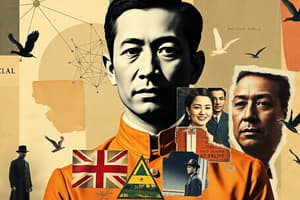Podcast
Questions and Answers
What concept did Rizal contribute to in the shift from pre-nationalism?
What concept did Rizal contribute to in the shift from pre-nationalism?
- Socialism
- National literature (correct)
- Religious reform
- Colonialism
What did Rizal believe about local languages in relation to culture?
What did Rizal believe about local languages in relation to culture?
- They were obstacles to unity.
- They were cultural resources for national unity. (correct)
- They should be abandoned for a unified language.
- They hindered international communication.
What was one of the fears the early nationalists had regarding Spanish influence?
What was one of the fears the early nationalists had regarding Spanish influence?
- It would encourage greater military presence.
- It would unite the people against colonization.
- It would lead to more economic opportunities.
- It could erase cultural autonomy. (correct)
How did Rizal approach the integration of Filipino culture?
How did Rizal approach the integration of Filipino culture?
What was the nature of the propaganda mission of Rizal and the early nationalists?
What was the nature of the propaganda mission of Rizal and the early nationalists?
What is the significance of Rizal's creation of a lexicon of known dialects?
What is the significance of Rizal's creation of a lexicon of known dialects?
Which regions did Rizal reference as similar examples of autonomous language use?
Which regions did Rizal reference as similar examples of autonomous language use?
What did the term 'internationalized' imply for the Filipinos during Rizal's time?
What did the term 'internationalized' imply for the Filipinos during Rizal's time?
What is one of the essential characteristics of Jose Rizal as described in Draft A?
What is one of the essential characteristics of Jose Rizal as described in Draft A?
According to Draft A, how did Rizal perceive the shortcomings of his fellow Filipinos?
According to Draft A, how did Rizal perceive the shortcomings of his fellow Filipinos?
What does Draft A imply about Rizal's narrative in 'Noli Me Tangere'?
What does Draft A imply about Rizal's narrative in 'Noli Me Tangere'?
Which draft emphasizes Rizal's moral virtues associated with true patriotism?
Which draft emphasizes Rizal's moral virtues associated with true patriotism?
What aspect of Rizal's character does Draft A specifically highlight?
What aspect of Rizal's character does Draft A specifically highlight?
Which of the following propositions is NOT mentioned in Draft A?
Which of the following propositions is NOT mentioned in Draft A?
What notion about Rizal's love for his country is presented in Draft A?
What notion about Rizal's love for his country is presented in Draft A?
What is the tone of Draft A regarding Jose Rizal's contributions?
What is the tone of Draft A regarding Jose Rizal's contributions?
What principle does the reading of Rizal's writings aim to develop in the youth?
What principle does the reading of Rizal's writings aim to develop in the youth?
What was Rizal's intention regarding the Catholic Church?
What was Rizal's intention regarding the Catholic Church?
Why is indiscriminate reading of Rizal's novels considered dangerous?
Why is indiscriminate reading of Rizal's novels considered dangerous?
What does Rizal's writing critique through fictional narrative?
What does Rizal's writing critique through fictional narrative?
What is a potential misconception that young people might have when reading novels?
What is a potential misconception that young people might have when reading novels?
What must be acknowledged about the historical context of Rizal's novels?
What must be acknowledged about the historical context of Rizal's novels?
What moral qualities are emphasized through the study of Rizal's writings?
What moral qualities are emphasized through the study of Rizal's writings?
What approach should be taken to ensure the responsible reading of Rizal's works?
What approach should be taken to ensure the responsible reading of Rizal's works?
What is the primary purpose of translating Rizal's novels according to the content?
What is the primary purpose of translating Rizal's novels according to the content?
What role does the teacher play in relation to Rizal's novels?
What role does the teacher play in relation to Rizal's novels?
How are Rizal's novels viewed in relation to the Catholic faith and morals?
How are Rizal's novels viewed in relation to the Catholic faith and morals?
What diminished aspect of Rizal's representation is highlighted in Draft C?
What diminished aspect of Rizal's representation is highlighted in Draft C?
What is noted as missing from Draft C that was present in Draft A?
What is noted as missing from Draft C that was present in Draft A?
What contemporary issue does Rizal's analysis address according to the content?
What contemporary issue does Rizal's analysis address according to the content?
What was Fr. Cavanna's significant action regarding Draft C?
What was Fr. Cavanna's significant action regarding Draft C?
Which of the following is NOT mentioned as a quality developed in the youth through Rizal's novels?
Which of the following is NOT mentioned as a quality developed in the youth through Rizal's novels?
What does Rizal believe is essential for literature's growth?
What does Rizal believe is essential for literature's growth?
How does Rizal view his novels in relation to time?
How does Rizal view his novels in relation to time?
What was the outcome of the bishops' reaction to the Rizal Bill of 1956?
What was the outcome of the bishops' reaction to the Rizal Bill of 1956?
Who commissioned Father Jesus Cavanna to draft the new Statement regarding Rizal's novels?
Who commissioned Father Jesus Cavanna to draft the new Statement regarding Rizal's novels?
What perspective does Horacio de la Costa adopt in his drafts about Rizal?
What perspective does Horacio de la Costa adopt in his drafts about Rizal?
What did Rizal imply about the nature of literature in relation to history?
What did Rizal imply about the nature of literature in relation to history?
Which of the following themes is central to Rizal's perspective on literature?
Which of the following themes is central to Rizal's perspective on literature?
What was a significant characteristic of Rizal's novels as per de la Costa's writings?
What was a significant characteristic of Rizal's novels as per de la Costa's writings?
Flashcards are hidden until you start studying
Study Notes
Assimilationism and Separatism
- Reflects the complex dynamic of pre-nationalism, nationalism, reformation, and revolution.
- Rizal (1880) marked a transition from pre-nationalism to nationalism, advocating for "national" literature.
Rizal's Contributions to Filipino Culture
- Conducted research and crafted a national history narrative, emphasizing Filipino identity.
- Created a lexicon encompassing various Filipino dialects from T'boli to Tagalog and Cebuano.
- Recognized local languages as vital cultural resources for fostering national unity.
Propaganda and Cultural Autonomy
- Early nationalists believed in portraying Filipinos as equals to Spaniards while warning against cultural erasure.
- Advocated for "internationalization" to help natives integrate into the global system.
Literature and Authority
- Rizal viewed literature as a means to assert authority, urging Filipinos to engage actively in literary creation.
- Emphasized that literature must engage in conversation with global contexts.
- Treated Noli Me Tangere as a reflection of contemporary issues, and El Filibusterismo as a vision for the future.
The Rizal Bill of 1956 and Church Response
- Horacio de la Costa’s pastoral letters present varied interpretations of Rizal’s moral significance.
- Initially portrayed Rizal positively as a moral figure dedicated to truth, later challenged by internal church politics.
- The bishops' commission, prompted by Archbishop Santos, condemned Rizal’s novels in an official statement, yet the prohibition was largely ineffective.
Overview of De la Costa's Drafts
- Five known drafts outline De la Costa's evolving stance on Rizal's legacy.
- Draft A highlights Rizal as a compassionate patriot combating injustice and promoting moral standards.
- Critiques in later drafts downplayed Rizal's moral role and the significance of his novels.
Key Propositions in Draft A
- Rizal recognized universally as a foremost figure in Filipino service.
- Described as possessing virtues constitutive of true patriotism and dedicated to enlightening his compatriots.
- Criticism directed at both foreigners and his countrymen, showing a well-rounded understanding of the nation’s issues.
- Advocated for introducing Rizal’s writings into education to instill constructive nationalism and civic virtues.
Concerns About Rizal's Novels
- There were warnings about misunderstanding fictional narratives as absolute truth, especially among the youth.
- Recommended that novels should be accurately translated and annotated for educational purposes, ensuring proper comprehension.
- Acknowledged that while potentially controversial, the novels can foster a love for the country aligned with moral teachings.
De la Costa's Evolving View
- In revised drafts, the emphasis on Rizal's moral role diminished, reflecting potential external pressures.
- Important foundational principles regarding truth and morality from Draft A were omitted in later versions, illustrating internal conflicts within the Church regarding Rizal’s representation.
Studying That Suits You
Use AI to generate personalized quizzes and flashcards to suit your learning preferences.




